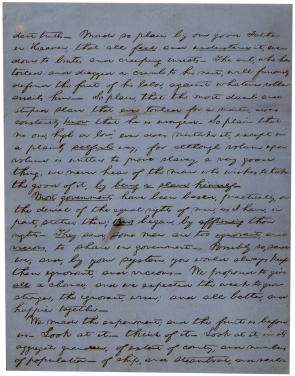Lincoln speech on slavery and the American Dream, 1858
A Spotlight on a Primary Source by Abraham Lincoln
 Through the 1830s and 1840s, Abraham Lincoln’s primary political focus was on economic issues. However, the escalating debate over slavery in the 1850s, and the Kansas-Nebraska Act in particular, compelled Lincoln to change his emphasis.
Through the 1830s and 1840s, Abraham Lincoln’s primary political focus was on economic issues. However, the escalating debate over slavery in the 1850s, and the Kansas-Nebraska Act in particular, compelled Lincoln to change his emphasis.
In this manuscript, a fragment from one of Lincoln’s speeches during the 1858 Illinois Senate race against Stephen Douglas, Lincoln advances the fundamental truth to which all creatures are entitled, declaring that even a slave kept in ignorance "does constantly know that he is wronged." And he uses economic logic against slavery, arguing that in freedom "the weak . . . grow stronger, the ignorant, wiser; and all better, and happier together." Lincoln also says of those who strive "to prove slavery a very good thing, we never hear of the man who wishes to take the good of it, by being a slave himself."
In these twenty-seven lines, Lincoln invokes the nation’s founding principles to stress the injustice of slavery, and in the course defines the American Dream, declaring, "Most governments have been based, practically, on the denial of the equal rights of men, as I have, in part, stated them; ours began, by affirming those rights."
A full transcript is available.
TRANSCRIPT
[evi-]dent truth. Made so plain by our good Father in Heaven, that all feel and understand it, even down to brutes and creeping insects. The ant, who has toiled and dragged a crumb to his nest, will furiously defend the fruit of his labor, against whatever robber assails him. So plain, that the most dumb and stupid slave that ever toiled for a master, does constantly know that he is wronged. So plain that no one, high or low, ever does mistake it, except in a plainly selfish way; for although volume upon volume is written to prove slavery a very good thing, we never hear of the man who wishes to take the good of it, by being a slave himself.
Most governments have been based, practically, on the denial of the equal rights of men, as I have, in part, stated them; ours began, by affirming those rights. They said, some men are too ignorant, and vicious, to share in government. Possibly so, said we; and, by your system, you would always keep them ignorant and vicious. We proposed to give all a chance; and we expected the weak to grow stronger, the ignorant, wiser; and all better, and happier together.
We made the experiment; and the fruit is before us. Look at it. Think of it. Look at it, in its aggregate grandeur, of extent of country, and numbers of population, of ship, and steamboat, and rail-
